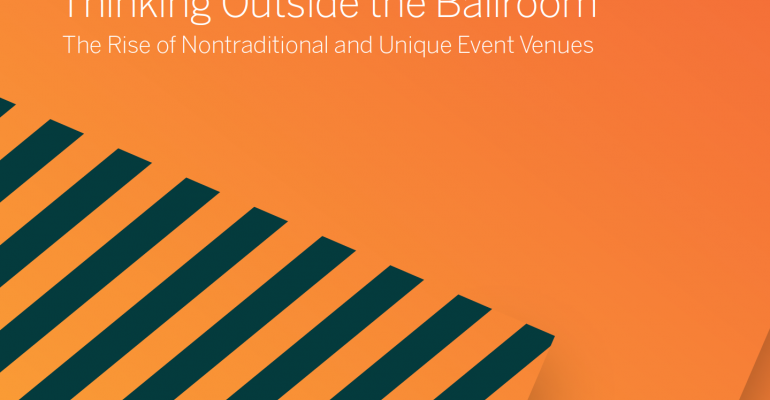Business culture is becoming less formal, and so are many of the meetings that support business goals. Participants are now looking for meetings to be more of an experience than just lectures and cocktail receptions in the expo hall, something more akin to Lollapalooza than Annual Meeting v2017. Add a rise in venue marketplaces designed to make it easier to find a nontraditional space for group events, and you have the underpinnings of a trend toward taking meetings out of hotels and convention centers and into a destination’s more unique venues.
A recent ebook by event marketing platform provider Eventbrite and unique venue marketplace provider Peerspace called “Thinking Outside the Ballroom: The Rise of Nontraditional and Unique Event Venues” makes the case for taking advantage of these increasingly popular options. It also offers a breakdown of what kind of events the four main types of nontraditional venues are best suited to accommodate.
1. Warehouses and Studios
These usually open, uncluttered, and unpretentious spaces tend to make participants “feel at ease and inspired,” according to the report, making them good options for popup dinners and corporate events.
2. Lofts and Rooftops
If you’re looking to inspire creativity and create a collaborative environment, the homey feel of these spaces, combined with cityscape views that give participants something to talk about, are good for retreats, cocktail parties, and small meetings, says the report.
3. Art Galleries and Museums
Décor is a done deal at these types of venues, making them “ideal for planners looking for spaces that are low-maintenance but make a big impact.” Their informal atmosphere also can encourage participants to interact, making them good options for galas, fundraisers, and cocktail parties.
4. Farmhouses, Vineyards, and Villas
Whether these are tucked away in the countryside or a more urban environment, these types of venues tend to have cottage-style elements and a lived-in feel that is a good fit for retreats and sustainable events. The report says, “These venues encourage attendees to show up, have fun, and leave their worries behind.”
Unique Venues, Unique Questions
While some of the questions planners would want to ask the venue are similar to those they’d ask a traditional facility—how much space is available and can it accommodate staging requirements, etc., and whether they require you to use their in-house AV vendors or caterers—the report also outlined some questions that those who are unfamiliar with booking a nontraditional venue might not think of, including:
• How will the time of year affect the venue’s suitability? This is especially key for any outdoor spaces you may be considering.
• What does the rate include? Is it hourly? Daily? Are there any hidden charges, security deposits, staffing fees, or other budgetary add-ons that you should be aware of?
• Are there any noise restrictions or curfews? “Some venues may require amplified music to end by 10 p.m., others might not allow it at all,” according to the report.
• What in-house assets can the venue supply? Do they have tables and chairs, AV, security, and enough juice to run the sound, lighting, and other electricity-powered aspects of your event? If not, you might need to contact a local event rental company, contract an outside security service, and rent a generator.
• Are there any scheduling issues specific to that event that you will have to accommodate? For example, the report says, a museum may not let you begin to set up until after it closes to the public for the day. “Leave ample time to set up before the event, and to clean up afterward.”





